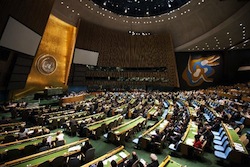Consensus Achieved at the NPT Review Conference
June 1, 2010
Featured Image
Today's top nuclear policy stories, with excerpts in bullet form.
Stories we're following today, Tuesday, June 1, 2010:
189 Nations Reaffirm Goal of Ban on Nuclear Weapons - The New York Times [link]
- Hard-fought negotiations over the future of the Nuclear Nonproliferation Treaty ended here on Friday with 189 nations reaffirming their commitment to eliminating all nuclear weapons and setting a new 2012 deadline for holding a regional conference to eliminate unconventional weapons from the Middle East..
- Tensions over the content of the final document after a month of negotiations went down to the wire, with diplomats portraying the last few days as a poker game with the United States and Iran each trying to call the other’s bluff.
- Earlier in the week, Vice President Joseph R. Biden Jr. and Gen. James L. Jones, the national security adviser, met with Arab ambassadors at the White House to work out compromise Middle East language.
- The United States accepted dropping direct linkage between a comprehensive Middle East peace and the regional denuclearizing conference, Arab diplomats said, as well as the one reference to Israel.
- Despite differences over the pace of disarmament and proliferation concerns, the document breathes new life into a treaty seen as under threat, analysts said.
U.N. Says Iran Has Fuel for 2 Nuclear Weapons - The New York Times [link]
- [The IAEA's latest report] released Monday revealed that Iran has now produced a stockpile of nuclear fuel that experts say would be enough, with further enrichment, to make two nuclear weapons.
- The toughly worded report says that Iran has expanded work at one of its nuclear sites. It also describes, step by step, how inspectors have been denied access to a series of facilities, and how Iran has refused to answer inspectors’ questions on a variety of activities.
- The inspectors reported Monday that Iran has now produced over 5,300 pounds of low-enriched uranium, all of which would have to undergo further enrichment before it could be converted to bomb fuel.
Sinking Strategy - Leon Sigal in The Boston Globe [link]
- In the wake of North Korea’s deadly attack on the South Korean naval warship Cheonan, the administration is now raising the stakes by supporting South Korea’s efforts to punish North Korea with more sanctions and to adopt “proactive deterrence.’’
- Yet punishment, even if justifiable, will not prevent another Cheonan any more than it has stopped North Korea from making more nuclear weapons.
- Worse, blockading North Korean shipping, stepping up naval patrols, and threatening to preempt militarily risks more firefights.
- Negotiations, whether in six-party talks or bilaterally, are the only way to keep that from happening.
- NOTE: Leon Sigal is a Ploughshares Fund grantee
America Changed. China Noticed. - All Things Nuclear Blog [link]
- In an article published [Thursday] after the release of the Obama administration’s new National Security Strategy, China’s Xinhua News Service noted that “One important change...was to change the Bush-era unilateralist approach and to emphasize cooperation and dialogue with the outside world.”
- The article also called attention to the Obama administration’s emphasis on the economic foundations of both national power and international security, as well as the administration’s desire to expand cooperation beyond traditional allies to include major developing nations like China and India.
- This echoes the arguments of Chinese leaders who see continuing integration with the international economy and increased international cooperation, rather than military power, as the key to China’s standing in the region and the world.
- As Chinese President Hu Jintao winds down his second and final term, the apparent withering away of Chinese concerns about American unilateralism is a welcome sign that anti-American posturing may not be a significant factor in shaping the foreign and military policies of the next Chinese administration.
Why Aren't More Iran War Hawks Called Anti-Israel? - Patrick Disney in the NIAC Insight blog [link]
- John Podhoretz, the editor of the neoconservative Commentary Magazine, had this to say yesterday about Obama’s approach to Iran: "Nothing would both surprise me, please me, and make me revisit a great deal of my thinking over the last couple of years, than if Barack Obama chooses to strike the Iranian nuclear program."
- He seems to be unfazed by the cognitive dissonance surrounding the idea that we should start a war with Iran that would generate a large-scale counterattack (likely aimed at Israel) in order to support Israel herself.
- Given that Iran’s defense plans most certainly call for activating its Hezboallah proxies — why does Podhoretz think Iran’s plans still wouldn’t call for that same counterattack if it’s the US instead of Israel that drops the bombs?
- The fact is, a war with Iran would cause an enormous amount of hardship, instability, and loss of life for the state of Israel, regardless of whether it’s the US or Israel that starts it.
- I often wonder why commentators like Podhoretz aren’t more frequently labeled anti-military or anti-Israel. Because nothing is more certain to take a disastrous toll on the lives of American troops and Israeli civilians than an unjustified military attack on Iran.



